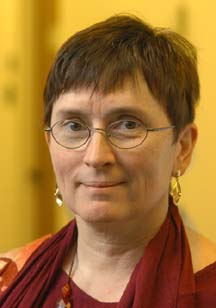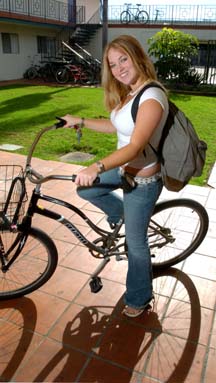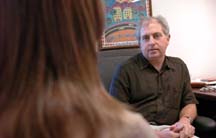Santa Barbara News-Press, December 19, 2004 (Sunday, p. A1, A18)
Mental health woes multiply at UCSB
By MORGAN GREEN, NEWS-PRESS STAFF WRITER
From anxiety and depression to suicidal behavior, students find it hard to cope
Student mental health problems are soaring at UCSB, overwhelming campus health and counseling services.
 |
The calls for help -- most often for depression and anxiety -- have risen so sharply over the past four years that Dr. Cynthia Bowers, director of UCSB Student Health Services, calls it "an epidemic."
During a recent 10-day period, she said, four students were involuntarily committed to medical facilities in the community. And hundreds more are receiving treatment or counseling on campus.
In response, the free campus medical and counseling services have been forced to change the way they operate, particularly to handle more crisis cases. Worried that somebody will fall through the cracks, they also are launching new efforts to reach more students "before they do damage to themselves or somebody else," Dr. Bowers said.
There has been a 77 percent jump in mental health appointments since 2001 with the clinic's primary care medical staff.
Other colleges across the country are seeing an increase too.
A CASE IN POINT
The story of a 21-year-old UCSB senior is typical.
Recalling her freshman year, the woman, who asked not to be identified, said: "I thought about hurting myself. I was doing horrible, crying during mid-terms and finals. I couldn't study. I broke up with my boyfriend in the spring. My grades went down. I couldn't sleep. I stopped eating."
For months, the then-19-year-old had been supporting herself with three part-time jobs while staggering along under a heavy load of 18 academic units. She wanted to go home that summer, but didn't have enough money to fly thousands of miles. "I just wanted to stay in bed. I lost my job. All my friends were gone. I had nobody around."
Realizing at last that she needed professional help, the woman sought counseling on campus and wound up at the student clinic, where she was prescribed antidepressants. It took her a year but she got back on track. "It's an ongoing thing," including continued counseling. "I have to take my medication all the time, and I check in with my nurse."
The increase in such mental health problems has hit universities across the nation for reasons nobody can firmly pinpoint, according to the American College Health Association. But experts point to two factors: More students arrive already on medication for mental illnesses, and many show up unprepared to cope with demanding studies and the responsibilities of life on their own.
MORE CRISIS CASES
It began everywhere about four years ago. At UCSB, with its tough academic standards and fast pace, student visits to campus psychiatrists have risen 28 percent since 2000. The specialists were tapped out last year with 3,334 visits mostly by students who need several to dozens of sessions each.
The overflow cases forced the clinic's primary care medical staff to take on hundreds of cases. Last year, they handled 879 such visits compared to 495 in 2000.
Across campus at Counseling and Career Services, which is staffed by psychologists, the "crisis" component of the caseload has soared from 288 three years ago to 401 last year, a 39 percent increase. "We have become a crisis center when we weren't before," said Jane Carlisle, associate director.
For lack of enough staff, most of the crisis cases are referred to private counselors off campus, which is one of the major factors driving up the university's costs for student health care insurance, Dr. Bowers said.
To be sure, more Americans in general are seeking care as the stigma attached to mental illness fades and many effective medicines have come on the market. For instance, between 1990 and 2002 nationwide psychiatric admissions for all disorders rose nearly 20 percent, according to the National Center for Health Statistics.
But UCSB officials who see struggling students every day say that doesn't account for such a sharp jump in four years on campuses. In any case, Dr. Bowers said the pattern shows no signs of letting up. In fact, the number of students who have sought mental health care on campus, "is just the tip of the iceberg."
Indeed, of seven students randomly approached by a reporter earlier this week, three said they had suffered from depression or anxiety symptoms powerful enough to undermine their health or disrupt their education. Five said they had friends who suffered, including one roommate who quit school altogether.
 |
PANIC ATTACKS
For Dana Gill it was "panic attacks" with a racing heartbeat and an inability to breathe. "It feels like somebody is sitting on your chest. It hurts."
Under the care of her hometown physician who prescribed medication from an inhaler, the attacks come infrequently and the French and English major is maintaining her 3.5 grade-point average. "It's a combination of prescription and just learning how to balance my time."
First treated while in high school, Ms. Gill blames the recurrence of her attacks to the stress of campus life. She holds down two part-time jobs to help with expenses, is taking a full academic load, and strives to maintain a social life with friends because "that's your only sanity."
Students have it rougher than people think, she said. "It's supposed to be the prime time of your existence. But we study so hard and get a job to pay the bills and worry about finals. My roommate and I get about three hours of sleep at night, and if we get six we're tossing and turning. It isn't good rest."
Ms. Carlisle said the UCSB counseling center is operating at capacity with psychologists seeing about 1,200 students each year with such problems and others. "Between 60 to 70 percent could benefit from some medication and therapy."
The phenomenon has campus counselors nationwide abuzz. The American College Health Association surveyed more than 47,000 students at 74 campuses and found that students diagnosed for depression at some time had jumped from 10.3 percent to 14.9 percent since 2000, according to results released last month.
Unlike some other universities, UCSB has not seen its student suicide rate rise, said Dr. Bowers, who estimated that one or two cases occur each year, "and it's really closer to one."
But she and others at UCSB feel the chilling shadow of one tragic case that took lives. Three years ago, a student with a history of mental illness, David Attias, ran down five people in Isla Vista with his car, killing four of them.
The story made national headlines and shook the university. "It brought the issue of mental issues to the forefront here," Dr. Bowers said.
NO CAUSE PINPOINTED
While there have been no comprehensive studies on the precise causes of the surge in student mental health problems, UCSB health officials have some opinions. In part, they say more cases could be appearing because many more students are arriving already diagnosed and on medication. These students "want to be like everybody else, so some stop taking their medicine," said Britt Andreatta, director of Office of Student Life programs aimed at freshmen.
Dr. Bowers believes there are more students coming from childhoods closely organized and supervised by parents, and they haven't had enough time on their own to learn how to solve their own problems. "There was always somebody there telling them what to do. Many don't have the social and conflict-resolution skills they need to survive here."
Unrealistic family- and self-expectations crop up too, she said. "You can't get into UC with a 4.0 grade-point average any more. It has to be better than that. Students have to push harder in high school, be perfect at everything. They get to the breaking point by the time they come here."
Financial strains can be a factor, too. For instance, some students from lower-income families and minority groups crumple under extra burdens, such as pressure to succeed for the whole family's sake while helping out at home with money from after-class jobs. Dr. Bowers said, "We have a huge number of students working 40 hours a week and who are expected to take care of family responsibilities."
Exacerbating the problem, many students don't tell anybody they are failing or struggling.
Support from friends and family at crisis times is vital, campus experts say.
Take student Stef-an Stagg, whose beloved uncle died at about the same time a friend committed suicide. Because of a mix-up in his college loan paperwork, he couldn't get into some classes he needed. Feeling overwhelmed, he discussed it with his father and left UCSB for an academic quarter. Back in school now, he said, "I found out a lot more about who I am by going home. It was a beautiful thing. It was more important than going to school."
Robin Ernster said she and her roommate had emotional crises at about the same time. "All of a sudden we were feeling overwhelmed, like I can't deal with it -- paying for college myself with two part-time jobs, knowing I have to get good grades. I didn't sleep, didn't feel I had time to eat. We both took it out in exercise at the rec center, and I went to my boyfriend. You need support, but you feel ridiculous for feeling upset."
But, Dr. Bowers said, too many don't seek help from family and friends, or professionals. So UCSB officials involved with student mental health have been trying new strategies to draw them in.
 |
Two years ago, the clinic hired the first social worker in the UC system, Burt Romotsky. At no charge, he helps students and their parents navigate the university's services and others in the community. This fall, he simplified the university's "distressed student response protocol," which describes how to recognize a troubled student and what to do about it. "We're trying to get any worried faculty or staff to just notify me," said Mr. Romotsky.
At Counseling and Career Services, which is free to students, one counselor is kept available at all times during regular office hours to handle walk-ins. "First it was one hour, then two. Now it's all day," said Ms. Carlisle.
A two-year-old cyber "mentor" program for freshmen was expanded this fall by the campus Office of Student Life to reach all students. Essentially, each receives an e-mail once a month from the mentor assigned to his or her class level, including graduate students.
The newsy e-mails "always start with a warm message saying hey, there are people here to support you. Let me know if you're struggling," said Ms. Andreatta, the freshmen class mentor and program's creator. Repeating that message in different words via computer, a medium students use, seems to be working, she said. "I do a lot of reassuring. We have students saying 'I'm totally dying here, you seem like you're really interested in me so I'll talk to you.' "
Nonetheless, averting tragedy is a day-to-day challenge and many students and parents remain confused about help available on campus. Many still incorrectly believe they cannot use the student clinic if they have private health insurance instead of coverage offered by UCSB. They can still use the clinic at $36 per visit, then get reimbursed by their own insurer, Dr. Bowers said.
On another front, she is seeking a federal grant "to put together a program of coordinated care between (UCSB) and the community for those who come to us with the more severe psychiatric conditions."
But the institution can only do so much, she said. "Just because you're smart doesn't mean you have what it takes to be successful at the University of California. You need resilience. You have to get up when you're knocked down, because you're going to get knocked."
TO GET HELP
Campus and Community
Resources:
- UCSB emergency personnel from phones on campus, 9911
- Emergency personnel off-campus, 911
- UCSB Counseling and Career Services, 893-4411, weekdays
- Campus Student Health, Urgent Care, 893-4173, weekdays
- UCSB Social Worker, 893-3380, weekdays
- Emergency Psychiatric Services at Santa Barbara Cottage Hospital, 569-8339, 24 hours.
- Helping, phone crisis counseling through the Family Service Agency, 692-4011, or 899-0061.
MIKE ELIASON / NEWS-PRESS PHOTOS
The hiring two years ago of licensed clinical social worker Burt Romotsky is one response by Student Medical Services to a flood of students seeking help for mental health problems.
Dr. Cynthia Bowers is director of UCSB Student Health Services.
STEVE MALONE / NEWS-PRESS PHOTO
Student Dana Gill has gotten medical help for "panic attacks."